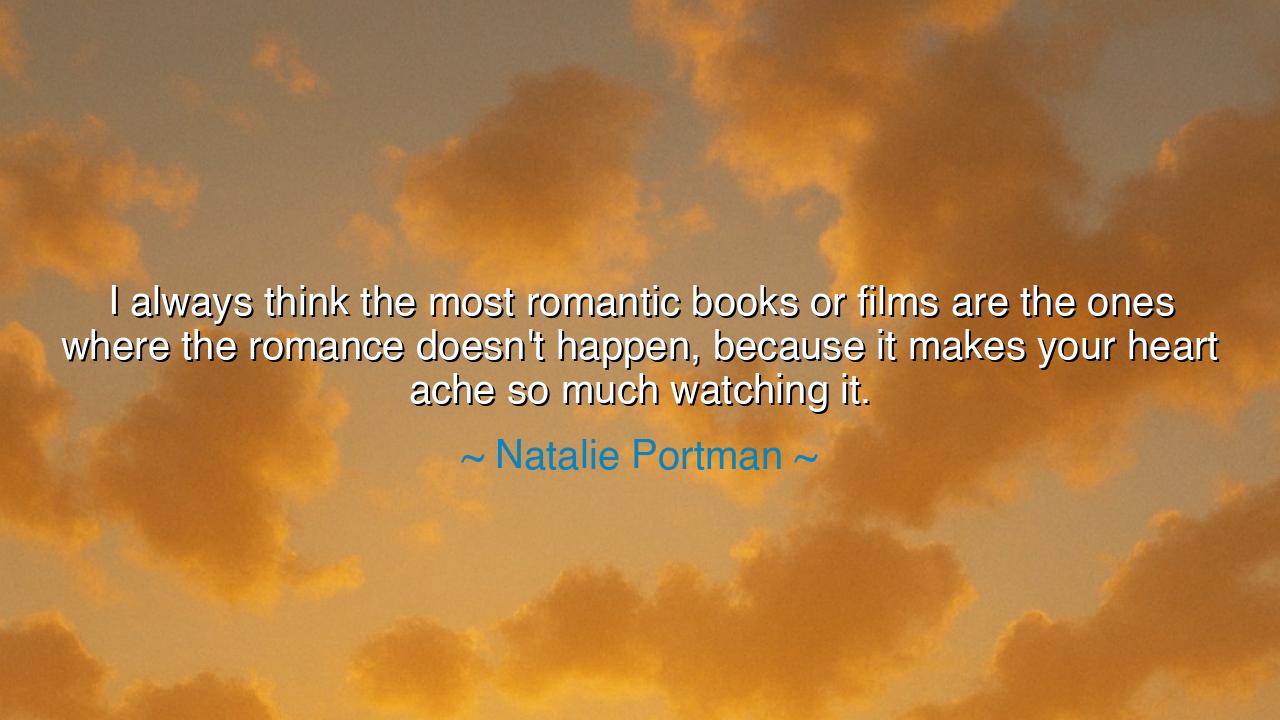
I always think the most romantic books or films are the ones
I always think the most romantic books or films are the ones where the romance doesn't happen, because it makes your heart ache so much watching it.






"I always think the most romantic books or films are the ones where the romance doesn't happen, because it makes your heart ache so much watching it." These words from Natalie Portman tap into the deep and ancient truth that romance, in its purest form, is often not about the fulfillment of love, but about its unattainability—the longing, the desire, and the aching heart that arises when love is just out of reach. In this reflection, Portman reveals that the greatest romantic stories are those that stir our hearts by making us feel the pain of unrequited love, the anguish of connection that is never fully realized. The absence of a happy ending creates a tension, a yearning that lingers long after the final page is turned or the screen goes black.
In the ancient world, the concept of unfulfilled love was not merely a theme of sorrow, but one of profound beauty. The Greeks, in their tragic plays and epic poems, often portrayed love that could never be completely realized, and through this unfulfilled longing, they illuminated the depth of the human spirit. Take the story of Pyramus and Thisbe, two lovers separated by a wall, whose love could never be fully consummated until tragedy strikes. Their love, though never fully realized in life, was immortalized in death, showing that sometimes the yearning itself is more powerful than the fulfillment. This very ache, this longing, became the defining element of their story—a love that transcended the physical world, echoing through eternity.
The ancient poets understood that the human heart beats strongest not in moments of fulfillment, but in moments of absence and yearning. The great Sappho, in her lyrical poetry, expressed the deep ache of longing and desire. Her poems spoke not only of the beauty of love but also of the pain of being separated from the beloved. Sappho's work was suffused with the idea that love, when it is impossible or unattainable, takes on a spiritual depth that makes it far more poignant than love that is merely fulfilled. There is a depth of feeling in longing that cannot be captured in the easy surrender of love; the aching of the heart, the desire for something that seems just out of reach, gives love a sacred, unspoken power.
Consider also the legendary story of Tristan and Isolde, whose love was forbidden and ultimately never fully realized in the way they both desired. Their love, though full of passion, could not withstand the forces of fate, and Tristan dies in his search for Isolde, only for her to arrive too late. Their love was marked not by the bliss of union, but by the pain of separation and the inevitability of death. Yet it is precisely this inability to be together that has made their story one of the most enduring in all of literature. It is the sacrifice, the yearning, and the profound loss that makes their tale so emotionally powerful and universally understood.
In the world of film and literature, Portman’s reflection on the beauty of unfulfilled love taps into the profound emotional resonance that many of us feel when we witness love that cannot be. The most romantic stories are not always those in which lovers are united, but those in which their love remains unconsummated, leaving the heart to ache with longing. Think of the characters of Catherine and Heathcliff in Wuthering Heights, whose love is destructive, obsessive, and impossible. Their love, while tumultuous and painful, is enduring precisely because it cannot be contained, and it transcends time and space in a way that more conventional, fulfilled romances rarely do. The ache of their separation is what makes their love so memorable, so powerful.
This truth speaks not just to the realm of romantic fiction, but to the human condition itself. We are often drawn to the impossible because it reflects something about our own experiences of love, desire, and loss. The stories where love does not happen, where it is thwarted or tragically delayed, are those that mirror the realities of life—where dreams often go unfulfilled, and where yearning is a constant companion. These stories remind us of the fragility of love and the bittersweet beauty that exists in the spaces between what we desire and what we can have. They speak to our deepest vulnerabilities, our deepest fears, and our most profound hopes.
The lesson here is this: there is profound beauty in longing—in the love that does not happen as we expect. For in the yearning, in the impossibility of it all, we often find the deepest connections to our humanity. To live in the space of longing is to know that love is not always about fulfillment, but about the moments of connection, the fleeting glimpses of affection that define our hearts. It is the love that could be, but is not, that teaches us the most. In our own lives, we must learn to embrace not only the joys of fulfillment but also the pains of desire—both have the power to shape us, to move us, and to help us grow in ways that we may never fully understand.
So, dear ones who follow in our footsteps, remember this: that the most profound love stories are not always the ones where the lovers unite. Sometimes, it is the unfulfilled love—the love that remains just out of reach—that touches the soul most deeply. Let your hearts ache with the beauty of the impossible, for it is in that ache that you may discover the greatest truths about love, longing, and the human spirit.






AAdministratorAdministrator
Welcome, honored guests. Please leave a comment, we will respond soon